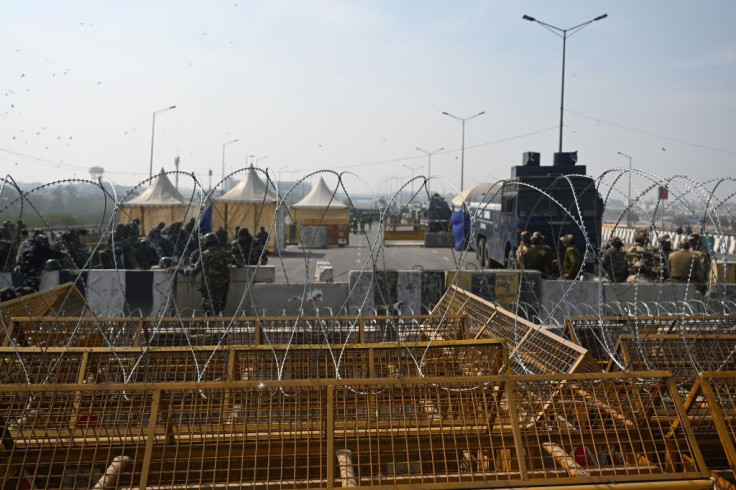India Farmers Protest: Journalist Arrested For Assaulting Police, Many Charged For Covering Rally
KEY POINTS
- Indian journalist Mandeep Punia was sent to jail for 14 days for allegedly assaulting police personnel while covering the farmers' protest in India
- Twitter blocked 250 accounts of journalists and notable personalities for covering or supporting the farmers protests
- Many independent journalists are facing charges for allegedly reporting false news
The ongoing tussle between Indian farmers and the government is far from over. Farmers from various states in India have taken to the streets, demanding that the Bharatiya Janata Party (BJP) government repeal the new farm laws. This has forced Twitter to temporarily shut down hundreds of accounts posting about the protests.
Since the Parliament of India passed the laws in September 2020, the farmer unions and their representatives have been requesting the parliament repeal the legislation as it allegedly exploits the interests of the farmers. There have been numerous rounds of talks between the unions and the government in which both the parties discussed various aspects of the laws. However, all meetings were in vain as no results were yielded. This has forced farmers to sit on streets in protest.
On-field reporters are also feeling the heat for covering the protests in large numbers. On Saturday, a freelance journalist named Mandeep Punia, who has been writing for the independent publication The Caravan magazine, was detained for violating the Indian Penal Code (IPL) section 186 (obstructing public servant in the discharge of their duties) and section 353 (assaulting a public servant while on duty) and has been sent to jail for 14 days, Indian Express first reported.
Several independent journalists have since protested against Delhi Police and have demanded his release.
Not just Punia, nine other journalists are facing criminal charges for reporting that Delhi Police allegedly shot a farmer in the head during the protests on Jan.26, The Guardian reported. Authorities have denied the reports, saying no shots were fired.
Among those charged is Siddharth Varadarajan, editor of The Wire, who called the charges “ridiculous” and believes it won’t stand.
“This case against me is ridiculous and will not stand but what the government really wants to ensure is that the dead man’s family does not repeat its claims and questions and is silenced,” The Guardian quoted Varadarjan as saying.

Following the uproar, numerous Twitter accounts posting about the protests were temporarily blocked after the Indian government sent a legal notice to the micro-blogging platform, India Today reported. The social media platform “withheld” almost 250 accounts from posting updates regarding the demonstrations. Official social media accounts of Kisan Ekta Morcha (The Farmers Union), The Caravan India, freelance journalist Sanjukta Basu, actor Sushant Singh, and more were not able to post anything for the most part of the day.
A Twitter spokesperson told India Today that if the company receives “a properly scoped request from an authorized entity, it may be necessary to withhold access to certain content in a particular country from time to time.”
“Upon receipt of requests to withhold content, we will promptly notify the affected account holders (unless we are prohibited from doing so, e.g. if we receive a court order under seal),” the spokesperson added.
Well someone I know as a strong voice against the atrocities of the Present government, @sushant_says ,his account has been blocked by @TwitterIndia . @sushant_says was leading the fight against abusive, Twitter handles that spew hate & threaten women.
— Tehseen Poonawalla Official 🇮🇳 (@tehseenp) February 1, 2021
Stunned @_sayema pic.twitter.com/oKE4TauOai
Why are so many Twitter accounts who are raising voice against the Govt are being withheld suddenly @TwitterIndia?
— Gaurav Pandhi (@GauravPandhi) February 1, 2021
There has to be an explanation. Has @Twitter succumbed in front of the Govt of India? This is pathetic @jack, you cannot have different yardstick for India & US.
SHOCKING!
— Dhruv Rathee 🇮🇳 (@dhruv_rathee) February 1, 2021
Twitter has withheld all prominent accounts which were raising their voice in support of Farmers because of some "legal" request. This kind of censorship is only seen in dictatorships. @thecaravanindia@HansrajMeena@Sushant_says @Kisanektamorcha@Tractor2twitr
The company did not provide further details of the legal notice it received. However, after receiving backlash, the social media platform eventually restored all the accounts.
The decision of blocking the accounts came almost 48 hours after the Ministry of Home Affairs (MHA) suspended the internet in and around the three protest sites -- Singhu Border (Delhi-Haryana border), Tikri Border (District West Delhi), and Ghazipur Border (Delhi-Uttar Pradesh border).
More than 60 farmers have died since the protests started on Nov. 24, 2020.
© Copyright IBTimes 2025. All rights reserved.





















